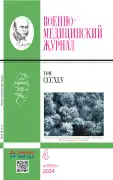Основы противорвотной терапии при химио-терапевтическом лечении
- Авторы: Лепкова Н.В.1,2, Егорова А.В.2, Бобрик Е.Н.2
-
Учреждения:
- ФГБУ «12 консультативно-диагностический центр» МО РФ
- ФГБОУ ВО «Российский национальный исследовательский медицинский университет имени Н.И.Пирогова» МЗ РФ
- Выпуск: Том 345, № 4 (2024)
- Страницы: 30-33
- Раздел: Лечебно-профилактические вопросы
- URL: https://journals.eco-vector.com/0026-9050/article/view/632026
- DOI: https://doi.org/10.52424/00269050_2024_345_4_30
- ID: 632026
Цитировать
Аннотация
Тошнота и рвота – частые и серьезные осложнения в терапии злокачественных новообразований. Внедрение в онкологическую практику более эффективных противорвотных агентов позволило полностью предотвращать развитие этих нежелательных явлений у подавляющего числа больных. Так, современные режимы антиэметогенной терапии позволяют достигать полного отсутствия рвоты у 70–90% пациентов. Как показывают результаты многих исследований, антиэметогенные режимы более эффективны в предотвращении рвоты, поэтому даже при достижении полного ответа на противорвотную терапию многие онкологические пациенты по-прежнему испытывают обременяющее чувство тошноты. Таким образом, несмотря на успехи современных методов, достижение абсолютного контроля не только над рвотой, но и над тошнотой остается нерешенной проблемой онкологии.
Ключевые слова
Полный текст
Об авторах
Н. В. Лепкова
ФГБУ «12 консультативно-диагностический центр» МО РФ; ФГБОУ ВО «Российский национальный исследовательский медицинский университет имени Н.И.Пирогова» МЗ РФ
Автор, ответственный за переписку.
Email: 12kdc@mil.ru
кандидат медицинских наук
Россия, Москва; МоскваА. В. Егорова
ФГБОУ ВО «Российский национальный исследовательский медицинский университет имени Н.И.Пирогова» МЗ РФ
Email: 12kdc@mil.ru
кандидат медицинских наук
Россия, МоскваЕ. Н. Бобрик
ФГБОУ ВО «Российский национальный исследовательский медицинский университет имени Н.И.Пирогова» МЗ РФ
Email: 12kdc@mil.ru
Россия, Москва
Список литературы
- Владимирова Л.Ю., Гладков О.А., Когония Л.М. и др. Практические рекомендации по профилактике и лечению тошноты и рвоты у онкологических больных // Злокачественные опухоли: Практические рекомендации RUSSCO. – 2018. – Т. 8, № 3s2 (специальный выпуск). – С. 502–511.
- Владимирова Л.Ю., Гладков О.А., Королева И.А. и др. Практические рекомендации по профилактике и лечению тошноты и рвоты у онкологических больных // Злокачественные опухоли: Практические рекомендации RUSSCO. – 2022. – Т. 12, № 3s2-2. – С. 26–39.
- Aapro M., Alberts D. High-dose dexamethasone for prevention of cis-platin-induced vomiting. // Cancer Chemother. Pharmacol. – 1981. – Vol. 7, N 1. – P. 11–14.
- Craig J.B., Powell B.L. Review: The Management of Nausea and Vomiting in Clinical Oncology // The American J. of the Med. Sciences. – 1987. – Vol. 293, N 1. – P. 34–44.
- Grunberg S.M., Warr D., Gralla R.J. et al. Evaluation of new antiemetic agents and definition of antineoplastic agent emetogenicity–state of the art // Supportive Care in Cancer. – 2011. – Vol. 19, N S1. – P. 43–47.
- Hesketh P.J., Kris M.G., S.M. Grunberg S.M. et al. Proposal for classifying the acute emetogenicity of cancer chemotherapy // J. Clin. Oncol. – 1997. – Vol. 15, N 1. – P. 103– 109.
- Jones D., Zhao F., Fisch M.J. et al. The Validity and Utility of the MD Anderson Symptom Inventory in Patients with Prostate Cancer: Evidence from the Symptom Outcomes and Practice Patterns (SOAPP) Data from the Eastern Cooperative Oncology Group // Clin. Genit. Cancer. – 2014. – Vol. 12, N 1. – P. 41–49.
- Marty M., Pouillart P., Scholl S. et al. Comparison of the 5-Hydroxytryptamine 3 (Serotonin) Antagonist Ondansetron (Gr 38032F) with High-Dose Metoclopramide in the Control of Cisplatin-Induced Emesis // New England J. of Med. – 1990. – Vol. 322, N 12. – P. 816–821.
- Molassiotis A., Coventry P.A., Stricker C.T. et al. Validation and Psychometric Assessment of a Short Clinical Scale to Measure Chemotherapy-Induced Nausea and Vomiting: The MASCC Antiemesis Tool // JPSM. – 2007. – Vol. 34, N 2. – P. 148–159.
- Navari R.M., Aаpro M. Antiemetic Prophylaxis for Chemotherapy-Induced Nausea and Vomiting // New England J. of Med. – 2016. – Vol. 374, N 14. – P. 1356–1367.
- Navari R.M., Gray S.E., Kerr A.C. Olanzapine Versus Aprepitant for the Prevention of Chemotherapy-Induced Nausea and Vomiting: A Randomized Phase III Trial // J. of Supportive Oncol. – 2011. – Vol. 9, N 5. – P. 188–195.
- Sanger G.J. Metoclopramide: A Template for Drug Discovery // J. Drug Discovery. – 2017. – Vol. 4, N 1. – P. 10–31.
- Zhang Z., Zhang Y., Chen G. et al. Olanzapine Based Triple Regimens Versus Neurokinin-1 Receptor Antagonist-Based Triple Regimens in Preventing Chemotherapy-Induced Nausea and Vomiting Associated with Highly Emetogenic Chemotherapy: A Network Meta Analysis // The Oncologist. – 2018. – Vol. 23, Iss. 5. – P. 603–616.
Дополнительные файлы







